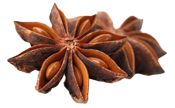Ouzo

Ouzo is a traditional drink which forms an integral part of the Greek cultural heritage, the reason for which the use of the name and its production is strictly regulated by the European Union. Ouzo can only be made in Greece. In every Greek restaurant and bar delicious appetizers known as mezedes are served accompanied by ouzo diluted with water turning it opaque or milky white. The most well known and best quality Ouzo is said to come from Lesbos Island. It is thought that the origins of ouzo distillation can be traced back to the ancient Greek civilization, influenced, most certainly by arak, a similar Middle Eastern drink.
Grapes or grape skins, aromatic herbs (such as star anise, coriander, cloves, angelica root, liquorice, mint, wintergreen, fennel, hazelnut, cinnamon and lime blossom) and berries are the ingredients for this drink of the gods and lesser mortals.
The grapes are pressed and other aromatics such as aniseed, its principal ingredient, are added at the fermentation stage. After fermentation distillation follows. A traditional copper alembic still (Soldered Union Alembic Still or Riveted Union Alembic Still) can be used for distilling ouzo. After distillation the distillate is cooled and stored for a few months before being diluted to obtain an alcoholic volume of between 38 and 46%.

